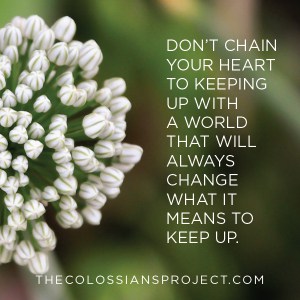I have spent much of the last twenty years feeling behind.
Behind in the small things — the schedule and the work and the routine.
Behind in the big things — the life and the kids and the goals.
In Colossians 2:20 through 3:4, Paul has taught us that our true life belongs to another world — that this life is weak and flimsy — unable to hold the weight of glory that has fallen on us through the righteousness of Christ.
And now, he begins to unwrap how this truth should impact our choices:
Put to death therefore what is earthly in you: sexual immorality, impurity, passion, evil desire, and covetousness, which is idolatry. (Colossians 3:5)
His kill-list, in the Greek, covers the whole of us:
Porneia, sexual activity outside of the biblical concept of marriage, sins of the body.
Akatharsia, unclean, self-gratifying thoughts and motives, sins of the mind.
Pathos, inordinate affection or passion, and its sister —
Epithumia, lust and desire, sins of the heart.
Pleonexia, greed, the ambitious pursuit of more at the expense of others, sins of action, lifestyle.
Put these to death, Paul says. Kill them off. Not because they are immoral (which they are), but because they are temporary, earthly. They belong to a place where we don’t.
And suddenly, we see why we can’t keep up:
We’re trying to live two lives at once.
Take akatharsia, for example — having unclean, corrupted thoughts and motives. We were created to bring glory to God, but we wear out our hearts and use up our hours to bring glory to ourselves in our lusts, our careers, our homes, our families.
Or take porneia, seeking sexual satisfaction outside of marriage. The marriage covenant was meant to display the ceaseless, unending love of Christ for His people. All other sexual fulfillment and fantasy displays inconstancy and unfaithfulness — it pushes back against the eternity in us — breaking our hearts and wasting our years.
Or there’s pathos, having inordinate, misplaced affections for the world — banking our emotions on its temporary solutions. When we preach something else more passionately than we preach Jesus — our health, our food, our safety, our politics, our lusts, our sports, our fads and plans — we live out of a heart divided. Our faith has become just another cause among many, and our days and emotions are ruled by anguish and fear over things destined to perish.
All of this is eidololatreia, Paul says — idolatry, the worship of another god.
And the god is me.
I still believe I am unrescued, on a crusade to save myself from loneliness and comparison and lack of purpose in this world when I already belong to another. Feeling like I can’t keep up is ultimately an identity crisis — a question of spiritual geography. Am I here, or am I there?
I am His, free, complete. In His country, the bar is fixed and the standard has been met. Yet I shackle myself to this world — where the rules are ever-shifting and the judgement is swift. I chain my heart to keeping up with a place that will always change what it means to keep up.
I put these desperate sins of body and life to death only when I move to the place of love and true worship — when I love the Lord my God with all my heart, with all my soul, and with all my mind (Matthew 22:36-37) — when I relocate my affections and goals to where He is, filling up so much of myself with him that it crowds out the weight of all other things.
Eternal life should bring rest to my temporary days. It should shape my passions and grant peace to my hours.
If it does not, perhaps I have not really believed it is true.
——




2 Comments
kafox1998
Thank you for putting into words what took me so long to learn. I especially love “when I relocate my affections and goals to where He is, filling up so much of myself with him that it crowds out the weight of all other things.” Can I get an AMEN!!!
Kelly
Amen 🙂